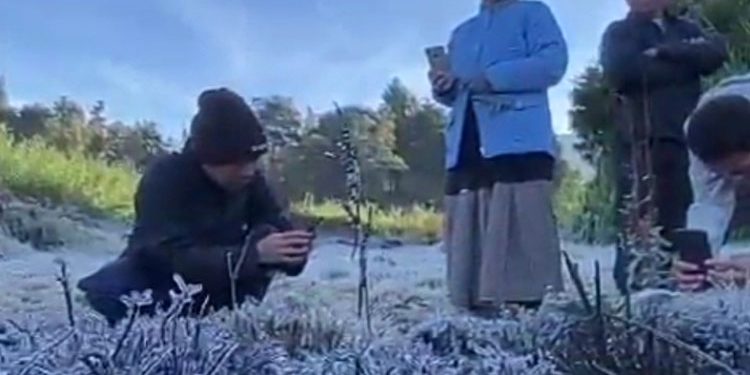In the heart of Central Java, Indonesia, near the revered Deng Temple in Banyarnegara, a grim situation has unfolded. Approximately seven hectares of potato crops have succumbed to the frequent dewfall in recent times, leaving farmers grappling with substantial losses. The natural phenomenon, which occurs in the Deng Plateau between July and September 2023 due to frost, has taken a toll on this year’s potato harvest, putting the livelihoods of local farmers in jeopardy. The losses incurred by potato farmers in Deng are estimated to have reached hundreds of millions.
The Plight of Young Potato Plants:
According to Deng farmers, the potato plants that have perished are relatively young, with an age range of 40 to 70 days. These plants are at a crucial stage of growth where they begin to yield potatoes. However, due to their small size at this point, harvesting is not economically viable.
Slamet Budiono, the head of Deng Kulon village in the Batur district of Banyarnegara, Central Java, confirmed this situation. He explained that “at 70 days, potato plants start bearing fruit, but they are still small, so harvesting them is not worthwhile.” Slamet, who is also a farmer himself, acknowledged that he has not found an effective method to protect potato crops from the ravages of the UPAS dew.
The Economic Impact:
The economic implications of this crisis are severe for Deng’s potato farmers. The cost of planting potatoes per hectare amounts to approximately 45-50 million Indonesian Rupiah (IDR). With seven hectares affected, the losses tally up to an additional 300 million IDR.
Slamet Budiono’s assessment aligns with these figures, emphasizing the gravity of the situation. “The cost of planting potatoes per hectare amounts to about 45-50 million. With 7 hectares, that’s an additional 300 million,” he explained. The financial burden on these farmers is palpable and threatens their livelihoods.
Challenges in Protecting Potato Crops:
Historically, farmers in the Deng region used weeds as natural cover to shield their potato seedlings from dew. However, this method has become ineffective against the persistent UPAS dew, which continues to infiltrate potato fields. Farmers are grappling with the need for innovative solutions to protect their crops from the increasingly unpredictable weather patterns.
Conclusion:
The Dengue Frost Effect is causing significant devastation to potato fields in Deng, Central Java. The losses faced by farmers are not merely financial but also have far-reaching implications for their livelihoods. As the frost and dewfall occurrences become more frequent, farmers must seek sustainable and resilient solutions to protect their crops and secure their future.
The government and agricultural experts should step in to provide support, guidance, and research to help Deng’s farmers combat the challenges posed by this natural phenomenon. Innovative farming techniques, protective measures against UPAS dew, and crop insurance could be explored as potential solutions to mitigate the impact of the Dengue Frost Effect on potato farming.
In conclusion, addressing this issue is not just a matter of economic importance; it is also a matter of food security and the well-being of the Deng community. Together, stakeholders, farmers, and policymakers can work towards a sustainable future for potato farming in Deng.







